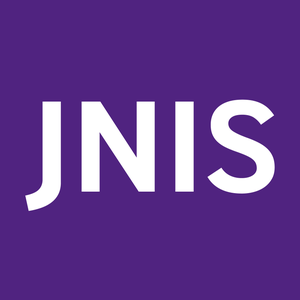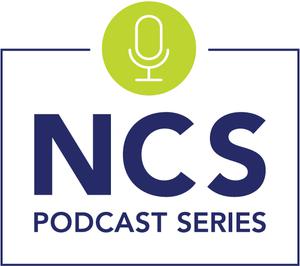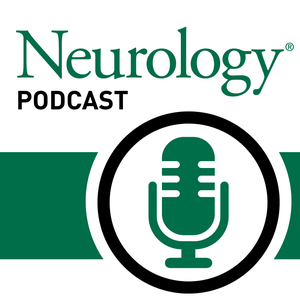
JNIS Podcast
BMJ Group
Podcasts from the Journal of NeuroInterventional Surgery featuring interviews and debates
- 15 minutes 45 secondsReviewing dual anti-platelet therapy durations after stent-assisted coiling
The use of assistive devices when treating unruptured aneurysms is widespread in neurointerventional practice. But there is no standard for how long patients should receive dual anti-platelet therapy after the procedure, to protect them from thrombotic complications. Durations can range from one month to one year. This episode looks at a review of patient data across 12 locations to understand the effect of therapy duration on risk of complications.
Dr Felipe C. Albuquerque, Editor-in-Chief of JNIS, interviews Dr. Andrew Ringer¹, first author of the paper:
Impact of duration of dual anti-platelet therapy on risk of complications after stent-assisted coiling of unruptured aneurysms
1. Mayfield Clinic, Cincinnati, Ohio, USA
Please subscribe to the JNIS podcast on your favourite platform to get the latest podcast every month. If you enjoy our podcast, you can leave us a review or a comment on Apple Podcasts (https://apple.co/4aZmlpT) or Spotify (https://spoti.fi/3UKhGT5). We'd love to hear your feedback on social media - @JNIS_BMJ.
7 January 2025, 11:13 am - 16 minutes 34 secondsNational trends in catheter angiography and cerebrovascular imaging
There has been a large increase in the number of non-invasive neurovascular studies performed in the last decade, particularly CT angiograms and MR angiograms. What has this meant for catheter-based angiography? This episode looks at an analysis done on a large claims database in the USA, to observe trends in imaging modalities, as well as the distinctions in use by neurosurgeons and radiologists.
Dr Felipe C. Albuquerque, Editor-in-Chief of JNIS, interviews Dr. Francis Jareczek¹ and Dr. D. Andrew Wilkinson¹, two of the authors of the paper:
National trends in catheter angiography and cerebrovascular imaging in a group of privately insured patients in the US.1. Neurosurgery, Penn State Health Milton S Hershey Medical Center, Hershey, Pennsylvania, USA
Please subscribe to the JNIS podcast on your favourite platform to get the latest podcast every month. If you enjoy our podcast, you can leave us a review or a comment on Apple Podcasts (https://apple.co/4aZmlpT) or Spotify (https://spoti.fi/3UKhGT5). We'd love to hear your feedback on social media - @JNIS_BMJ.
12 December 2024, 10:33 am - 22 minutes 11 secondsMalpractice claims and complaints in Neurointervention
Although many U.S. neurointerventionalists report at least one stressful malpractice claim over their career, the majority conclude without any court proceedings or direct repercussions in their practice. In this podcast, we look at the prevalence and causes of malpractice claims and complaints filed with state medical boards against neurointerventionalists, and some of the risk factors in an increasingly busier field.
Dr Felipe C. Albuquerque, Editor-in-Chief of JNIS, interviews Dr Kyle M. Fargen (Wake Forest University, Winston-Salem); and Dr Joshua A. Hirsch (Massachusetts General Hospital, Boston), both members of the editorial board of the journal and the authors of the paper:
Medical malpractice claims and state medical board complaints among United States neurointerventionalists.Please subscribe to the JNIS podcast on your favourite platform to get the latest podcast every month. If you enjoy our podcast, you can leave us a review or a comment on Apple Podcasts (https://apple.co/4aZmlpT) or Spotify (https://spoti.fi/3UKhGT5). We'd love to hear your feedback on social media - @JNIS_BMJ.
4 October 2024, 9:52 am - 20 minutes 5 seconds’L-stenting’ for wide-neck bifurcation aneurysms
Single-stent assisted coiling techniques such as ‘L-stenting’ are an alternative to intrasaccular devices for wide-neck bifurcation aneurysms. In this episode, Aliya Siddiqui¹ and Dr. Reade De Leacy² join JNIS editor-in-chief Dr. Felipe Albuquerque to discuss the background and findings of their recent study, regarding the efficacy and safety of the 'L-stenting' technique.
Read the paper: A core-lab adjudicated analysis of single-stent assisted coiling of wide-neck bifurcation aneurysms
1. Medical College of Wisconsin, Milwaukee, USA
2. Neurosurgery, Icahn School of Medicine at Mount Sinai, New York, USA
Please subscribe to the JNIS podcast on your favourite platform to get the latest podcast every month. If you enjoy our podcast, you can leave us a review or a comment on Apple Podcasts (https://apple.co/4aZmlpT) or Spotify (https://spoti.fi/3UKhGT5). We'd love to hear your feedback on social media - @JNIS_BMJ.
Thank you for listening! This episode was produced and edited by Brian O'Toole.
4 July 2024, 1:12 pm - 18 minutes 11 secondsNeuropsychiatric consequences of aneurysmal subarachnoid hemorrhage
Patients with good motor function outcomes after aneurysmal subarachnoid hemorrhage treatment may still be left with neuropsychiatric effects. They can suffer from such difficult conditions as cognitive dysfunction, depression and sexual dysfunction. Not all of these patients will volunteer their symptoms unprompted on follow-up. This outcome type has had limited study, and became an interest of today's guest, Dr. Jose Danilo Bengzon Diestro (1). JNIS editor-in-chief Dr. Felipe Albuquerque speaks with him on this subject, based on the recently published paper, "Long-term neuropsychiatric complications of aneurysmal subarachnoid hemorrhage: a narrative review".
(1) Department of Medicine, University of Toronto, Toronto, Canada
Please subscribe to the JNIS podcast on your favourite platform to get the latest podcast every month. If you enjoy our podcast, you can leave us a review or a comment on Apple Podcasts (https://apple.co/4aZmlpT) or Spotify (https://spoti.fi/3UKhGT5). We'd love to hear your feedback on social media - @JNIS_BMJ.
Thank you for listening! This episode was produced and edited by Brian O'Toole.
7 May 2024, 4:10 pm - 19 minutes 25 secondsGeographic disparities in high-grade aneurysmal subarachnoid hemorrhage treatment
Alis Dicpinigaitis (1) and Dr. Fawaz Al-Mufti (2) join JNIS Editor-in-Chief, Dr. Felipe C. Albuquerque, to discuss the study, "Mapping geographic disparities in treatment and clinical outcomes of high-grade aneurysmal subarachnoid hemorrhage in the United States". They explain the findings of their study, covering the predictive impact of factors including age, insurance status, race, and hospital ownership.
Read the paper: https://jnis.bmj.com/content/early/2024/02/19/jnis-2023-021330
(1) New York Presbyterian - Weill Cornell Medical Center, New York, New York, USA
(2) Department of Neurosurgery, Westchester Medical Center at New York Medical College, Valhalla, New York, USA
Please subscribe to the JNIS Podcast via all podcast platforms, including Apple Podcasts, Google Podcasts, Stitcher and Spotify, to get the latest episodes. Also, please consider leaving us a review or a comment on the JNIS Podcast iTunes page: https://podcasts.apple.com/gb/podcast/jnis-podcast/id942473767
Thank you for listening! This episode was produced and edited by Brian O'Toole.
5 April 2024, 3:59 pm - 18 minutes 1 secondIntra-arterial nimodipine treatment of subarachnoid hemorrhage patients
Dr. Michael Veldeman (1) joins JNIS Editor-in-Chief, Dr. Felipe C. Albuquerque, to discuss the study, "Intra-arterial nimodipine for the treatment of refractory delayed cerebral ischemia after aneurysmal subarachnoid hemorrhage". Dr. Veldeman explains the methods of the study, the growing significance of computerised tomography perfusion imaging in diagnosis of unconscious patients, the use of induced hypertension, and interventional complications that arose when treating subarachnoid hemorrhage patients.
Read the paper: https://jnis.bmj.com/content/early/2023/12/16/jnis-2023-021151
(1) Department of Neurosurgery, RWTH Aachen University Hospital Aachen, Aachen, Germany
Please subscribe to the JNIS Podcast via all podcast platforms, including Apple Podcasts, Google Podcasts, Stitcher and Spotify, to get the latest episodes. Also, please consider leaving us a review or a comment on the JNIS Podcast iTunes page: https://podcasts.apple.com/gb/podcast/jnis-podcast/id942473767
Thank you for listening! This episode was produced and edited by Brian O'Toole.
13 February 2024, 10:58 am - 19 minutes 30 secondsFive year results of the Woven EndoBridge Intra-saccular Therapy study (WEB-IT)
JNIS Editor-in-Chief, Dr. Felipe C. Albuquerque, is joined from New York by Prof. David Fiorella (1) to discuss the paper, "Safety and effectiveness of the Woven EndoBridge (WEB) system for the treatment of wide necked bifurcation aneurysms: final 5 year results of the pivotal WEB Intra-saccular Therapy study (WEB-IT)". Prof. Fiorella explains the results of this extensive study across 27 locations, with the WEB device proving to be a durably effective and safe endovascular treatment option for wide-necked bifurcation aneurysms.
Read the paper: https://jnis.bmj.com/content/15/12/1175
(1) Department of Neurosurgery, State University of New York at Stony Brook, Stony Brook, New York, USA
Please subscribe to the JNIS Podcast via all podcast platforms, including Apple Podcasts, Google Podcasts, Stitcher and Spotify, to get the latest episodes. Also, please consider leaving us a review or a comment on the JNIS Podcast iTunes page: https://podcasts.apple.com/gb/podcast/jnis-podcast/id942473767
Thank you for listening! This episode was produced and edited by Brian O'Toole.
13 December 2023, 1:27 pm - 23 minutes 40 secondsEVT triage for acute ischemic stroke
JNIS Editor-in-Chief, Dr. Felipe C. Albuquerque, is joined from Calgary by Dr. Johanna Ospel (1) to discuss "Recent developments in pre-hospital and in-hospital triage for endovascular stroke treatment", a paper detailing the many aspects of resource allocation when treating stroke patients.
Read the paper: https://jnis.bmj.com/content/early/2022/10/14/jnis-2021-018547
(1) Departments of Radiology and Clinical Neurosciences, University of Calgary, Calgary, Alberta, Canada
Please subscribe to the JNIS Podcast via all podcast platforms, including Apple Podcasts, Google Podcasts, Stitcher and Spotify, to get the latest episodes. Also, please consider leaving us a review or a comment on the JNIS Podcast iTunes page: https://podcasts.apple.com/gb/podcast/jnis-podcast/id942473767
Thank you for listening! This episode was produced and edited by Brian O'Toole.
5 October 2023, 1:17 pm - 32 minutes 22 secondsPoint/Counterpoint: Stenting for idiopathic intracranial hypertension
In this podcast, JNIS Editor-in-Chief, Dr. Felipe C. Albuquerque, speaks with Dr. Michael Levitt (1) and Dr. Colin Derdeyn (2), authors of a pair of editorials discussing the practice of dural venous sinus stenting for patients with idiopathic intracranial hypertension.
Point: Dural venous sinus stenting should be considered a first-line treatment option for select patients with idiopathic intracranial hypertension https://jnis.bmj.com/content/early/2023/06/20/jnis-2023-020597
Counterpoint: stenting for idiopathic intracranial hypertension should be trialed
https://jnis.bmj.com/content/early/2023/06/20/jnis-2023-020404These articles are free-to-access for a month following the publication of this podcast.
Please subscribe to the JNIS Podcast via all podcast platforms, including Apple Podcasts, Google Podcasts, Stitcher and Spotify, to get the latest episodes. Also, please consider leaving us a review or a comment on the JNIS Podcast iTunes page: https://podcasts.apple.com/gb/podcast/jnis-podcast/id942473767
Thank you for listening! This episode was edited by Brian O'Toole.
(1) Neurological Surgery, University of Washington School of Medicine, Seattle, Washington, USA
(2) Radiology, University of Iowa Hospitals and Clinics, Iowa City, Iowa, USA16 August 2023, 9:58 am - 18 minutes 20 secondsPredictors for large vessel recanalization before stroke thrombectomy: the HALT score
In this podcast, JNIS Editor-in-Chief, Dr. Felipe C. Albuquerque, speaks with Dr. Marco Colasurdo (1) and Prof. Dheeraj Gandhi (2), authors of the original research article, "Predictors for large vessel recanalization before stroke thrombectomy: the HALT score" - https://jnis.bmj.com/content/early/2023/04/25/jnis-2023-020220
This paper is free-to-access for a month following the publication of this podcast.
Please subscribe to the JNIS Podcast via all podcast platforms, including Apple Podcasts, Google Podcasts, Stitcher and Spotify, to get the latest episodes. Also, please consider leaving us a review or a comment on the JNIS Podcast iTunes page: https://podcasts.apple.com/gb/podcast/jnis-podcast/id942473767
Thank you for listening! This episode was edited by Brian O'Toole.
(1) Interventional Neuroradiology, Dept. of Diagnostic Radiology, Uni. of Maryland Medical Center, Baltimore, Maryland, USA
(2) Dept. of Radiology and Biomedical Imaging, Yale School of Medicine, New Haven, Connecticut, USA26 May 2023, 4:18 pm - More Episodes? Get the App
Your feedback is valuable to us. Should you encounter any bugs, glitches, lack of functionality or other problems, please email us on [email protected] or join Moon.FM Telegram Group where you can talk directly to the dev team who are happy to answer any queries.
 Neurocritical Care Society Podcast
Neurocritical Care Society Podcast
 Neurology® Podcast
Neurology® Podcast
 Freakonomics Radio
Freakonomics Radio